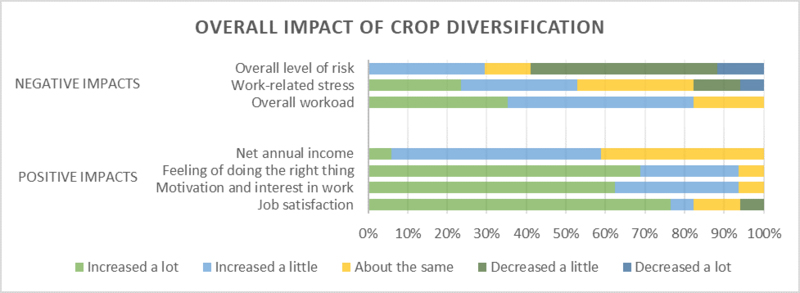The study focused on the experiences of 17 farmers engaged in three UK case studies (case study 2, case study 15 and case study 24) that are part of DiverIMPACTS. The objective was to explore how a number of socio-economic factors, including workload, labour organisation and quality of life have changed as a result of crop diversification. The explorative study seeks to understand how farmers cope with increasing crop diversity and what support from value chain actors, stakeholders and community members may be beneficial.

The results suggest that most farmers engaging in diversification have experienced an increase in overall workload, however this appears to be traded off with an increase in job satisfaction, interest in work, sense of doing the right thing, and in some cases increased income, although it is clear this is not the main motivating factor. The more diverse systems reported a greater increase in overall workload. There are mixed results related to changes in overall risk and work-related stress and it appears this has increased most in arable systems (case study 15). It appears this may be due to the fact that crop diversification in arable systems necessitates a more fundamental change in labour organisation, activities and greater risks in moving from commodity markets to alternative value chains for arable crops. However, it is also met with a number of rewards including satisfaction from building relationships with others across the value chain and increased resilience to market / biophysical fluctuations.
The results also demonstrate a change in labour organisation with an increase in the amount of time dedicated to a range of activities – in particular communication and collaboration, learning and experimenting and dealing with logistics. In most cases the increase in workload has not been accompanied by increase in number of workers; as such, the strain on individuals has increased.
In sum, support from farmers and other actors in the value chain appears to be crucial whilst policy support is generally not considered to be particularly helpful in its current form. Recommendations include for policy support to be more flexible, allowing for retroactive payments, and grants appropriate for smaller businesses which encourage collaboration between farmers.
To find out more about the study, you can view the recording of the webinar held by the authors. More information is available here.
